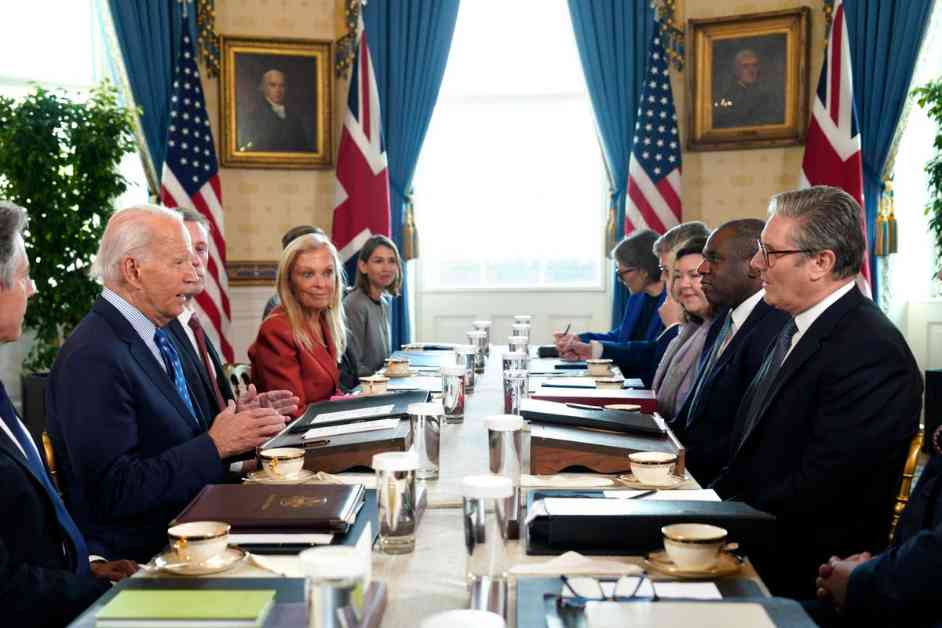President Joe Biden and Sir Keir Starmer joined forces in a united response against Vladimir Putin’s nuclear threats during a high-stakes meeting at the White House. The leaders grappled with the escalating tensions between Ukraine and Russia, particularly concerning the potential use of long-range missiles in the conflict. As the world watched anxiously, the fate of Storm Shadow missiles and their deployment remained uncertain.
Pressure mounted on both Biden and Starmer as Ukraine’s President Volodymyr Zelensky pleaded for the authorization to use Storm Shadow weapons against Russian targets. However, no final decision was reached during the talks, leaving the issue unresolved for the time being. Politico reported that the matter would be revisited at the upcoming UN General Assembly meeting later this month, where a broader group of stakeholders would be involved in the discussions.
The meeting between Biden and Starmer was overshadowed by a series of provocative actions by Putin, including the expulsion of six UK diplomats from Moscow on charges of espionage. The Russian president issued threats of war with NATO if permission was granted for the use of Storm Shadow missiles, emphasizing Russia’s nuclear capabilities to drive his point home. Meanwhile, Zelensky’s urgent appeals for swift action underscored the human cost of the ongoing conflict, with lives hanging in the balance.
Despite international condemnation, Russia remained unapologetic for targeting a Ukrainian cargo ship in the Black Sea, further fueling tensions in the region. Experts warned against capitulating to Russian aggression, urging Biden and Starmer to stand firm in the face of Putin’s threats and intimidation tactics.
Challenges and Strategic Considerations
The diplomatic standoff between the West and Russia presented a complex array of challenges and strategic considerations for Biden and Starmer. The decision on whether to authorize the use of Storm Shadow missiles by Ukraine carried significant implications for the conflict’s trajectory and the broader geopolitical landscape. Balancing the need for deterrence against Russian aggression with the risk of escalating into a full-blown war required careful deliberation and foresight.
Zelensky’s impassioned pleas for advanced weaponry to defend Ukraine highlighted the urgent need for international support in the face of Russian military incursions. The delay in approving the use of Western missiles only served to prolong the suffering of Ukrainian civilians and embolden Putin’s aggressive tactics. As the situation continued to deteriorate, the pressure on Biden and Starmer to act decisively increased, with the fate of millions hanging in the balance.
International Response and Diplomatic Efforts
The international response to the Ukraine-Russia conflict reflected a delicate dance of diplomacy and brinkmanship, with world leaders navigating a minefield of competing interests and strategic calculations. Johnson’s vocal support for Ukraine’s right to self-defense resonated with Zelensky’s calls for decisive action against Russian aggression. The solidarity shown by Western allies in condemning Putin’s belligerence sent a strong message of unity and resolve in the face of adversity.
However, the threat of unintended escalation loomed large, with the risk of miscalculation or miscommunication potentially triggering a catastrophic chain of events. The delicate balance of power in the region hinged on a delicate interplay of military capabilities, diplomatic maneuvering, and strategic foresight. As tensions continued to simmer, the need for clear-headed leadership and decisive action became more pressing than ever.
Humanitarian Crisis and the Toll of Conflict
Amidst the geopolitical maneuvering and military posturing, the human cost of the conflict in Ukraine was starkly evident. The relentless bombardment of civilian areas, the displacement of families, and the destruction of infrastructure painted a grim picture of the toll of war. Zelensky’s impassioned plea for air defense systems and advanced weaponry underscored the urgent need to protect innocent lives and safeguard Ukraine’s sovereignty.
The plight of Ukrainian citizens caught in the crossfire of geopolitical rivalries highlighted the urgent need for a coordinated international response to alleviate their suffering. As the world watched in horror, the specter of a full-scale war loomed large, with the potential for catastrophic consequences reverberating far beyond the borders of Ukraine. The urgent need for humanitarian assistance and diplomatic intervention underscored the gravity of the situation and the imperative for swift, decisive action.
In conclusion, the high-stakes meeting between Biden and Starmer underscored the precarious balance of power in the face of escalating tensions between Ukraine and Russia. The decision on the use of Storm Shadow missiles carried significant implications for the conflict’s trajectory and the broader geopolitical landscape. As world leaders grappled with the complex array of challenges and strategic considerations, the human cost of the conflict remained front and center, underscoring the urgent need for a coordinated international response to mitigate the suffering of innocent civilians. As the world watched anxiously, the fate of Ukraine hung in the balance, with the decisions made in the corridors of power reverberating far beyond the borders of the embattled nation.












